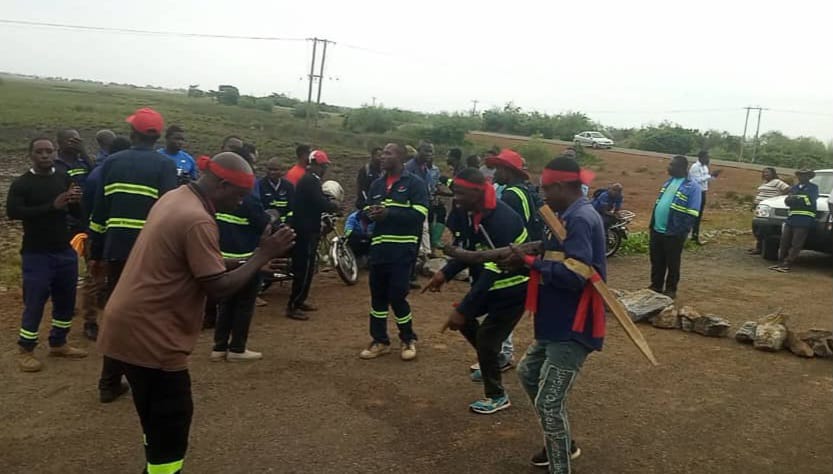
Dozens of disgruntled workers of Electrochem Ghana Limited on Monday morning besieged the premises of the company at Ada in the Greater Accra Region, demanding the immediate payment of eight months’ salary arrears. Clad in red bands and chanting protest songs, the aggrieved employees accused management of diverting their unpaid wages to sponsor this year’s Asafotufiam Festival, allegedly in a bid to win the loyalty of some traditional leaders amid growing resistance from the local population.
The workers, who say they have been left impoverished over the past several months, are threatening to disrupt the revered annual festival if their demands are not met.
“We work tirelessly, but for eight months we haven’t received a single cedi. Yet the company finds money to sponsor chiefs and celebrate festivals. If we don’t get our salaries before the Asafotufiam, we will make sure the festival does not happen,” one protester warned.
The workers believe the company’s lavish sponsorship of the festival—including reports of financing a luxury retreat for chiefs at the Safari Valley Resort—is a calculated attempt to solidify traditional backing, as tensions rise between Electrochem and sections of the Ada community over control and use of the Songor Lagoon concession.
Electrochem, a subsidiary of the McDan Group, claims it was granted a 41,000-acre salt mining concession in 2020. However, the deal which the people say is not fair has been mired in controversy, with many local residents and opinion leaders accusing the company of displacing indigenous salt winners and monopolizing a communal resource protected under PNDC Law 287.
Three weeks ago, the youth of Ada, backed by some aggrieved opinion leaders, announced plans to stage a peaceful protest against both the company and some chiefs they accuse of betraying their people. The planned demonstration—meant to highlight what they describe as “the theft of our ancestral livelihood”—was, however, thwarted after the Ghana Police Service declined to provide protection for the march, citing security concerns.
“We have been silenced for too long. They say the Songor belongs to the people, but now it feels like it belongs to a few powerful men,” one of the frustrated youth leaders told reporters at the time.
In January this year, violent confrontations were reported between Electrochem’s security personnel and youth groups following allegations that company guards had assaulted a sub-chief of Sege-Nakomkope. This led to the seizure of some of the company’s installations by protesters in what they described as retaliation for provocation and marginalization.
The situation has become even more volatile with accusations that some traditional leaders have been compromised. Critics claim the chiefs’ continued support for Electrochem’s operations comes at the cost of community interests. This has further deepened rifts within the Ada Traditional Council and drawn the attention of political actors.
The National Democratic Congress (NDC), government which has historically supported community ownership of the Songor Lagoon, has called for a full-scale review of the Electrochem concession. Some party executives have even been accused by the Traditional Council of instigating hostile takeovers and attacks against the company, claims the NDC has denied.
However, despite the ongoing widespread discontent, the government has largely remained silent on the matter. While security agencies have intervened during prior protests, no clear roadmap has been presented to address the grievances of workers and community members.
With the Asafotufiam Festival set to begin in the coming days, the threat by Electrochem workers to disrupt the celebration has intensified anxiety within the community. The festival is a revered cultural event for the people of Ada, and any disturbance could further heighten tensions.
What’s at Stake
At stake are not only unpaid wages and cultural harmony, but also broader issues of land rights, community benefit, corporate accountability, and trust in traditional leadership.
For many in Ada, the protest by Electrochem workers is not just about salaries—it is a symptom of a deeper struggle over the control and future of the Songor Lagoon, a natural resource that for generations sustained local livelihoods.
Electrochem Ghana is yet to respond officially to the workers’ claims as of the time of filing this report.

